#p: lynn williams
Explore tagged Tumblr posts
Text
ObSESSED
#the teal????#the lace??????#hi p and Polly pocket in the background#and Britt!!!#woso#nwsl#uswnt#lynn williams
90 notes
·
View notes
Text
The pilot for Black Lightening aired on January 16, 2018. Cress Williams played principal Jefferson Pierce, who secretly used to be the super hero Black Lightening. Events occured to cause him to suit up once more to protect his students and city. ("The Resurrection" Black Lightening, TV Event)

#nerds yearbook#real life event#first appearance#sci fi tv#dc#dc comics#january#2018#black lightening#tony isabella#trevor von eeden#salim akil#cress williams#jefferson pierce#china anne mcclain#jennifer pierce#nafessa williams#anissa pierce#christine adams#lynn pierce#marvin jones iii#tobia whale#super hero#damon gupton#bill henderson#james remar#peter gambi#dabier#will#skye p. marshall
5 notes
·
View notes
Text
















K I S S O G R A P H Y : ↳ Hugh Jackman
CORELLI (1995) / Deborrah Lee Furness SOMEONE LIKE YOU (2001) / Ashley Judd SWORDFISH (2001) / Halle Berry KATE & LEOPOLD (2001) / Meg Ryan X2: X-MEN UNITED (2003) / Famke Janssen VAN HELSING (2004) / Kate Beckinsale X-MEN: THE LAST STAND (2006) / Famke Janssen SCOOP (2006) / Scarlett Johansson THE FOUNTAIN (2006) / Rachel Weisz THE PRESTIGE (2006) / Scarlett Johansson AUSTRALIA (2008) / Nicole Kidman X-MEN ORIGINS: WOLVERINE (2009) / Lynn Collins THE WOLVERINE (2013) / Tao Okamoto THE GREATEST SHOWMAN (2017) / Michelle Williams BAD EDUCATION (2019) / Rafael Casal REMINISCENCE (2021) / Rebecca Ferguson
#hugh jackman#hjackmanedit#kissography#filmedit#marveledit#romancegifs#dailyflicks#cinemapix#dailymenedit#dilfgifs#mancandykings#dailymensource#dailymencelebs#tvandfilm#fyeahmovies#filmtvcentral#tvfilmsource#otpsource#flawlesscelebs#movie kiss#kiss#tv kiss#kisses#kissing#passionate#set: various#*
725 notes
·
View notes
Text


Band of Brothers Birthdays
January
1 John S. Zielinski Jr. (b. 1925)
21 Richard D. “Dick” Winters (b. 1918)
26 Herbert M. Sobel (b. 1912)
30 Clifford Carwood "Lip" Lipton (b. 1920)
31 Warren H. “Skip” Muck (b. 1922) & Robert B. Brewer (b. 1924)
February
8 Clarence R. Hester (b. 1916)
18 Thomas A. Peacock (b. 1920)
23 Lester A. “Les” Hashey (b. 1925)
March
1 Charles E. “Chuck” Grant (b. 1922)
2 Colonel Robert L. “Bob” Strayer (b. 1910)
4 Wayne “Skinny” Sisk (b. 1922)
10 Frank J. Perconte (b. 1917)
13 Darrell C. “Shifty” Powers (b. 1923)
14 Joseph J. “Joe” Toye (b. 1919)
24 John D. “Cowboy” Halls (b. 1922)
26 George Lavenson (b. 1917) & George H. Smith Jr. (1922)
27 Gerald J. Loraine (b. 1913)
April
3 Colonel Robert F. “Bob” Sink (b. 1905) & Patrick S. “Patty” O’Keefe (b. 1926)
5 John T. “Johnny” Julian (b. 1924)
10 Renée B. E. Lemaire (b. 1914)
11 James W. Miller (b. 1924)
15 Walter S. “Smokey” Gordon Jr. (b. 1920)
20 Ronald C. “Sparky” Speirs (b. 1920)
23 Alton M. More (b. 1920)
27 Earl E. “One Lung” McClung (b. 1923) & Henry S. “Hank” Jones Jr. (b. 1924)
28 William J. “Wild Bill” Guarnere (b. 1923)
May
12 John W. “Johnny” Martin (b. 1922)
16 Edward J. “Babe” Heffron (b. 1923)
17 Joseph D. “Joe” Liebgott (b. 1915)
19 Norman S. Dike Jr. (b. 1918) & Cleveland O. Petty (b. 1924)
25 Albert L. "Al" Mampre (b. 1922)
June
2 David K. "Web" Webster (b. 1922)
6 Augusta M. Chiwy ("Anna") (b. 1921)
13 Edward D. Shames (b. 1922)
17 George Luz (b. 1921)
18 Roy W. Cobb (b. 1914)
23 Frederick T. “Moose” Heyliger (b. 1916)
25 Albert Blithe (b. 1923)
28 Donald B. "Hoob" Hoobler (b. 1922)
July
2 Gen. Anthony C. "Nuts" McAuliffe (b. 1898)
7 Francis J. “Frank” Mellet (b. 1920)
8 Thomas Meehan III (b. 1921)
9 John A. Janovec (b. 1925)
10 Robert E. “Popeye” Wynn (b. 1921)
16 William S. Evans (b. 1910)
20 James H. “Moe” Alley Jr. (b. 1922)
23 Burton P. “Pat” Christenson (b. 1922)
29 Eugene E. Jackson (b. 1922)
31 Donald G. "Don" Malarkey (b. 1921)
August
3 Edward J. “Ed” Tipper (b. 1921)
10 Allen E. Vest (b. 1924)
15 Kenneth J. Webb (b. 1920)
18 Jack E. Foley (b. 1922)
26 Floyd M. “Tab” Talbert (b. 1923) & General Maxwell D. Taylor (b. 1901)
29 Joseph A. Lesniewski (b. 1920)
31 Alex M. Penkala Jr. (b. 1924)
September
3 William H. Dukeman Jr. (b. 1921)
11 Harold D. Webb (b. 1925)
12 Major Oliver M. Horton (b. 1912)
27 Harry F. Welsh (b. 1918)
30 Lewis “Nix” Nixon III (b. 1918)
October
5 Joseph “Joe” Ramirez (b. 1921) & Ralph F. “Doc” Spina (b. 1919) & Terrence C. "Salty" Harris (b. 1920)
6 Leo D. Boyle (b. 1913)
10 William F. “Bill” Kiehn (b. 1921)
15 Antonio C. “Tony” Garcia (b. 1924)
17 Eugene G. "Doc" Roe (b. 1922)
21 Lt. Cl. David T. Dobie (b. 1912)
28 Herbert J. Suerth Jr. (b. 1924)
31 Robert "Bob" van Klinken (b. 1919)
November
11 Myron N. “Mike” Ranney (b. 1922)
20 Denver “Bull” Randleman (b. 1920)
December
12 John “Jack” McGrath (b. 1919)
31 Lynn D. “Buck” Compton (b. 1921)
Unknown Date
Joseph P. Domingus
Richard J. Hughes (b. 1925)
Maj. Louis Kent
Father John Mahoney
George C. Rice
SOURCES
Military History Fandom Wiki
Band of Brothers Fandom Wiki
Traces of War
Find a Grave
#this is going off who was on on the show#i double checked the dates and such but if you notice any mistakes please let me know :)#band of brothers#easy company#hbo war#not gonna tag everyone lol#mine: misc#yep it's actually Halls and not Hall#i've seen Terrence Harris's name spelled with as Terence but wenand t with two Rs s#since that's how it's spelled on photos of memorials and on his gravestone#I’ll do the pacific next! should be significantly shorter since there’s far fewer characters 😅
183 notes
·
View notes
Text

* FAMOUS INDIVIDUALS WITH YOUR MOON SIGN.

If you’re looking for suggestions on which authors and music artists to check out next, look to your moon sign! In Western astrology, the moon is said to represent your subconscious mind, emotions, and inner personality, so it is widely believed that we tend to relate to media by artists who share our moon sign.

♈️ ARIES MOON
WRITERS:
Gore Vidal
George R. R. Martin
Nicholas Sparks
Rick Riordan
Jennifer Lynn Barnes
Christopher Paolini
MUSICIANS:
P!nk
Whitney Houston
Céline Dion
Selena Gomez
Rihanna
Tupac

♉️ TAURUS MOON
WRITERS:
Jodi Picoult
F. Scott Fitzgerald
Hans Christian Anderson
Clive Barker
George Bernard Shaw
Aldous Huxley
MUSICIANS:
Pharrell Williams
Kelly Clarkson
Bob Dylan
Demi Lovato
Christina Aguilera
Pitbull

♊️ GEMINI MOON
WRITERS:
C. S. Lewis
Fyodor Dostoevsky
Orson Scott Card
Franz Kafka
Margaret Mitchell
R.A. Salvatore
T. S. Elliot
MUSICIANS:
Ella Fitzgerald
Florence Welch
Art Garfunkel
Billy Idol
Sia
Tina Turner

♋️ CANCER MOON
WRITERS:
George Orwell
Liu Cixin
Brandon Sanderson
Cassandra Clare
Diana Gabaldon
Lois Lowry
MUSICIANS:
Tchaikovsky
Taylor Swift
Kurt Cobain
Halsey
Aretha Franklin
Janis Joplin

♌️ LEO MOON
Oscar Wilde
Holly Black
Geraldine Brooks
James Dashner
Jack London
Ta Nehisi Coates
MUSICIANS:
Lana Del Ray
Paul McCartney
Queen Latifah
Niall Horan
Bruno Mars
David Bowie

♍️ VIRGO MOON
WRITERS:
Leo Tolstoy
John Grisham
Claudia Gray
Isabel Allende
Xiran Jay Zhao
Douglas Adams
MUSICIANS:
Dolly Parton
Nicki Manaj
Madonna
Lorde
Bo Burnham
Lizzo

♎️ LIBRA MOON
WRITERS:
Jane Austen
Chimamanda Ngozi Adichie
Sylvia Plath
William Shakespeare
Maya Angelou
R.F. Kuang
MUSICIANS:
Ariana Grande
Charli XCX
Bruce Springsteen
Jay-Z
Harry Styles
Fergie

♏️ SCORPIO MOON
WRITERS:
Veronica Roth
Edith Wharton
V.E. Schwab
Harper Lee
Keira Cass
Meg Cabot
MUSICIANS:
Lady Gaga
Tyler the Creator
Cyndi Lauper
Beyoncé
Bob Marley
The Weeknd

♐️ SAGITTARIUS MOON
WRITERS:
Stephen King
Victor Hugo
Marie Lu
Suzanne Collins
Samantha Shannon
Adam Silvera
MUSICIANS
Hozier
Freddie Mercury
Adele
Ludwig Van Beethoven
Chappell Roan
John Legend

♑️ CAPRICORN MOON
WRITERS:
Sarah J. Maas
J.M. Barrie
Jeff Shaara
Joyce Carol Oates
Stephanie Meyer
Angie Thomas
MUSICIANS:
Frédéric Chopin
Neil Diamond
Jon Bon Jovi
Lin-Manuel Miranda
Stevie Nicks
Donna Summer

♒️ AQUARIUS MOON
WRITERS:
Margaret Atwood
Leigh Bardugo
Louisa May Alcott
Seth Grahame-Smith
Anthony Horowitz
S.E. Hinton
MUSICIANS:
Cody Simpson
Marilyn Monroe
Britney Spears
Billie Eilish
Tim McGraw
Carrie Underwood

♓️ PISCES MOON
WRITERS:
Toni Morrison
Edgar Allen Poe
Malcolm Gladwell
Lisa McMann
Alice Oseman
Philippa Gregory
MUSICIANS:
Kenny Chesney
Elvis Presley
Frank Sinatra
Prince
Kendrick Lamar
Sabrina Carpenter

#astrology observations#astro notes#astro community#taylor swift#* astrology#taylornation#astrology#astrology notes#chappell roan#bookblr#sabrina carpenter#billie eilish#pjo fandom#percy jackson
77 notes
·
View notes
Text
List of free audiobooks on YouTube for anyone interested
The Hunger Games by Suzanne Collins
Pride & Prejudice by Jane Austen
The Great Gatsby by F. Scott Fitzgerald
Diary of a Wimpy Kid by Jeff Kinney
The Adventures of Tom Sawyer by Mark Twain
Alice in Wonderland
Animal Farm by George Orwell
The Shadow Over Innsmouth by H P Lovecraft
Frankenstein by Mary Shelley
Crime and Punishment by Fyodor Dostoyevsky
Hatchet by Gary Paulsen
Twelve Years a Slave by Solomon Northup
Of Mice and Men by John Steinbeck
The Village by Caroline Mitchell
The Wonderful Wizard of Oz
Harry Potter and the Philosopher’s Stone (fuck JKR)
Sense & Sensibility by Jane Austen
The Handmaid’s Tale by Margaret Atwood
Twilight by Stephanie Meyer
Upside Down by Danielle Steel
The Fiancée by Kate White
The Silence of the Lambs by Thomas Harris
Percy Jackson & the Olympians: The Lightning Theif
Accidentally Married by Victoria E. Lieske
I’m Glad My Mom Died by Jennette McCurdy
The Collector (book one) by Nora Roberts
The Lies I Told by Mary Burton
Dead Man’s Mirror by Agatha Christie
The Hobbit
The Taken Ones by Jess Lourey
The Good Neighbour by R J Parker
The Island House by Elana Johnson
Desperation by Stephan King
The Healing Summer by Heather B. Moore
The Last Affair by Margot Hunt
To Be Claimed by Willow Winter
Romeo and Juliet by Shakespeare
The Hitchhiker’s Guide to the Galaxy
The Inn by James Patterson
Wonder by R J Palacio
Faking It With The Billionaire by Willow Fox
The Lost Years by Mary Higgins Clark
Forrest Gump by Winston Groom
The Janson Directive by Robert Ludlum
The Catcher in the Rye
The Lottery Winner by Mary Higgins Clark
Where Eagles Dare by Alistair MacLean
Death of a Nurse by M C Beaton
Yours Truly by Abby Jimenez
Treasure Island by Robert Louis Stevenson
The Sonnets by William Shakespeare
Frozen Betrayal by Clive Cussler
The Picture of Dorian Gray by Oscar Wilde
Line of Fire by R J Patterson
Don’t Believe Everything You Think by Joseph Nguyen
The Remnant by Tim LaHaye
The Magic of Reality by Richard Dawkins
The Secret of Chimneys by Agatha Christie
Payment in Kind by J A Jance
The Idiot by Fyodor Dostoyevsky
The Way of the Superior Man by David Deida
The Game of Life and How to Play It by Florence Scovel Shinn
The Richest Man in Babylon by George S. Clason
To Kill a Mockingbird by Harper Lee
A Marriage of Anything but Convenience by Victorine E. Lieske
The Adventures of Huckleberry Finn by Mark Twain
A Christmas Carol by Charles Dickens
The Inheritance Game by Jennifer Lynn Barnes
Ikigai: The Japanese Secret to a Long and Happy Life
Thinking Fast and Slow by Daniel Kahneman
How to Win Friends and Influence People by Dale Carnegie
The Kama Sutra by Mallanaga Vatsyayana
The Wisdom of Father Brown by G K Chesterton
Robinson Crusoe by Daniel Defoe
Robin Hood by J Walker McSpadden
The Poor Traveller by Charles Dickens
Days on the Road: Crossing the Plains in 1865 by Sarah Raymond Herndon
Oliver Twist by Charles Dickens
Atomic Habits by James Clear
I Have No Mouth, and I Must Scream
Trading in the Zone by Mark Douglas
The Art of War by Sun Tzu
The Secret Garden by Frances Hodgson Burnett
A Short History of Nearly Everything by Bill Bryson
The Return of Sherlock Holmes by Arthur Conan Doyle
The Epic of Gilgamesh
Lord of the Flies by William Golding
A Tale of Two Cities by Charles Dickens
Man After Man
Five on a Treasure Island by Enid Blyton
The Red Badge of Courage by Stephen Crane
Charlotte’s Web
Midsummer Mysteries by Agatha Christie
Out of Silent Planet by C S Lewis
The Valley of Fear by Arthur Conan Doyle
Eaters of the Dead by Michael Crichton
The Murder on the Orient Express by Agatha Christie
The Castle of Otranto by Horace Walpole
21 Lessons for the 21st Century by Yuval Noah Harai
Hamlet by Shakespeare
#mental health#positivity#self care#mental illness#self help#recovery#ed recovery#pro recovery#study#study affirmations#studying#studyblr#school#free#audiobooks#YouTube#piracy#bookblr#books#reading#long reads#comfort#meditation#book#study resources#web resources#lizzy grant#poetry#motivation#self love
101 notes
·
View notes
Note
Hi there! I am about midway through reading your story Lost Vocabularies and it is amazing!! The whole series has been so lovely, I’m obsessed with the way you write! The way that you convey the boys complicated emotions and capture all the little nuances of their dynamic has me feral!! Beyond even them the way you inject so much personality into the locations is so good, I feel like I am there!! So thank you for writing this lovely story 💕 I was wondering if you happen to have a list of all the books that Bucky and Steve read? I have been looking up a lot of them and adding them to my to read list bc they sound so interesting lol! On that same note, how did you decide what books to mention? Are they all ones that you have read or did you do research to find ones you thought they would like?
I’ve been coming back and rereading this kind and wonderful comment in my inbox over the last few weeks when way too many massive, stressful, time-sensitive things were all happening at once. 💕 But since I have a little breather between crazy periods, I get to dive in here as a treat.
Lost Vocabularies involved a lot of research, which I hope isn’t apparent because I didn’t want there to be any noticeable difference between the parts of the story that are based on places I’d been, foods I’d tried and books I’d read personally—and what was created purely based on research. Fingers crossed that the seams don't show!
In this series, we see both Steve and Bucky use art to process—helping them understand themselves and connect to the world again. Bucky is drawn to stories while Steve as an artist is much more visual, but the underlying impulse is similar. In the same way that you learn a lot by glancing through someone’s bookshelves, what characters read is interesting to me, and revealing. This version of Bucky is a very private person so these books offer a glimpse into his inner life. And as the POV character we get to experience all these things alongside Steve.
I’m not much of a sci-fi or fantasy reader so some of Bucky’s picks were a real challenge for me. But I wanted these to be grounded in the characters and the storytelling functions, not based on my own taste and opinions, though of course those always bleed through.

Steve’s Reading List
The Day of the Triffids by John Wyndham
Alice Neel: People Come First by Kelly Baum and Randall Griffey
The Thing on the Doorstep and Other Weird Stories by H. P. Lovecraft
The Beautiful Mysterious: The Extraordinary Gaze of William Eggleston, edited by Ann J. Abadie
One Mighty and Irresistible Tide: The Epic Struggle Over American Immigration, 1924-1965 by Jia Lynn Yang

Bucky’s Reading List
The Thing on the Doorstep and Other Weird Stories by H. P. Lovecraft
A Scanner Darkly by Philip K. Dick
QED: The Strange Theory of Light and Matter by Richard Feynman
Do Androids Dream of Electric Sheep? by Philip K. Dick
Six Not-So-Easy Pieces: Einstein's Relativity, Symmetry, and Space-Time by Richard Feynman
Nonlinear Dynamics And Chaos by Steven H. Strogatz
Stranger in a Strange Land by Robert A. Heinlein
I’ve included some notes and commentary on why I picked each of these works under the cut.
The Same River, Twice (The Man Is Still Left with His Hands)
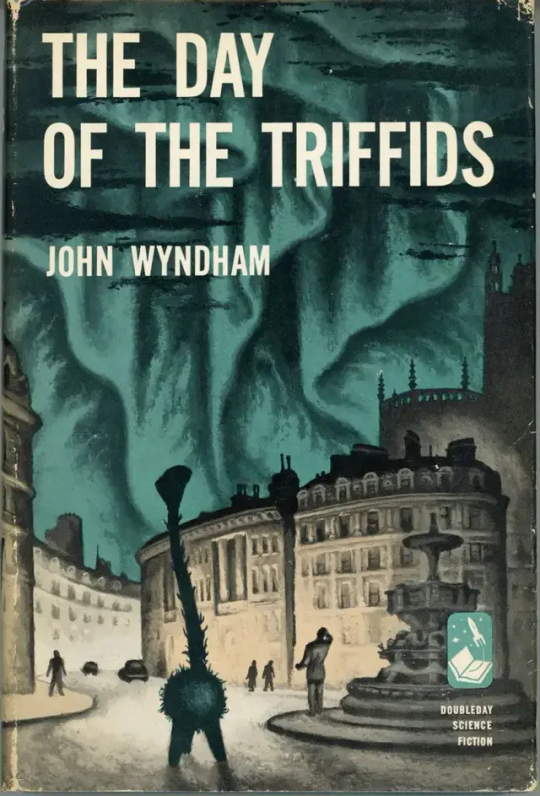
The Day of the Triffids by John Wyndham
Classic post-WWII dystopian sci-fi that focuses on society collapsing after a series of catastrophes that were unintentional but very much caused by people, which leads to a lot of the population becoming blind. Thematically this work engages with the loss of identity that people, both abled and disabled, face in the process of survival and a dark look at what happens after societies break down. How this applies to Bucky is obvious, but part of the argument of this post-Endgame series is that it applies to Steve, too.
Also, there are huge mobile carnivorous plants.
Fun fact: the opening of this novel is said to have been the inspiration for 28 Days Later!
Still Left with the River (The Paradox of Motion)
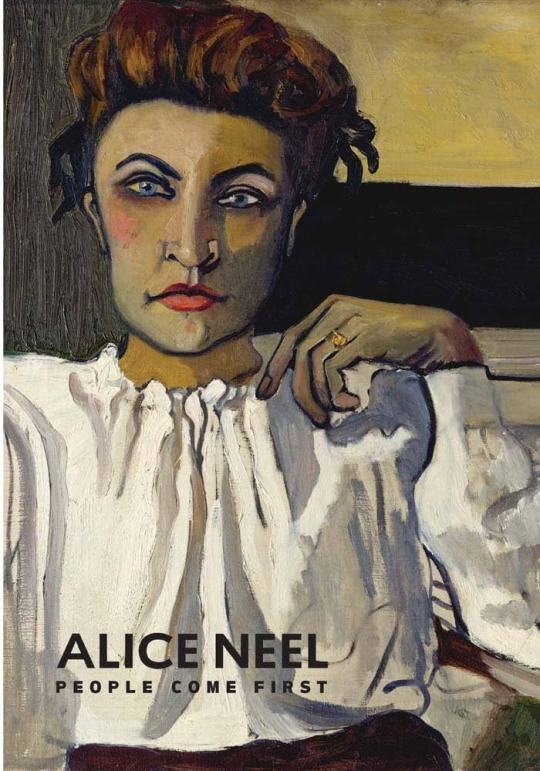
Alice Neel: People Come First by Kelly Baum and Randall Griffey
Alice Neel’s portraits are extraordinary, almost unnervingly vivid. In this story, Steve is familiar with her work as a fellow New York-based artist active in communist circles in the 1930s. She also worked for the WPA, producing wonderful street scenes that documented New York neighborhoods of the era.
To be honest, I have so many questions about what Steve was up to in the late 1930s before his war mania of the 40s hits.
One of the core themes of this series is Steve struggling with what his body is for if it’s no longer for violence. Who is he if he’s not a soldier? What is his radically changed body if it’s not a weapon? How do you come home from the war?
In this regard, Steve and Bucky have all kinds of shared life experience.
So thematically I include Neel because of her startling gift for capturing personalities and bodies through a process of frank, earnest, truthful observation of the integrated completeness of body and self: this space that’s you.
But a book of Alice Neel’s work with her sensitive portraits and fleshy frank nudes pulls him into flipping through page after page of these personalities and bodies, not idealized: seen.
Steve isn’t ready for that when he bumps into this big “impractical” art book in a holdover Barnes & Noble in Brooklyn, not when he’s still so shook up and adrift. But he will be.
There’s such empathy and radical humanism to her pieces. “People,” as she famously said, “come first.” I stand by the conclusion that Steve would love her work.
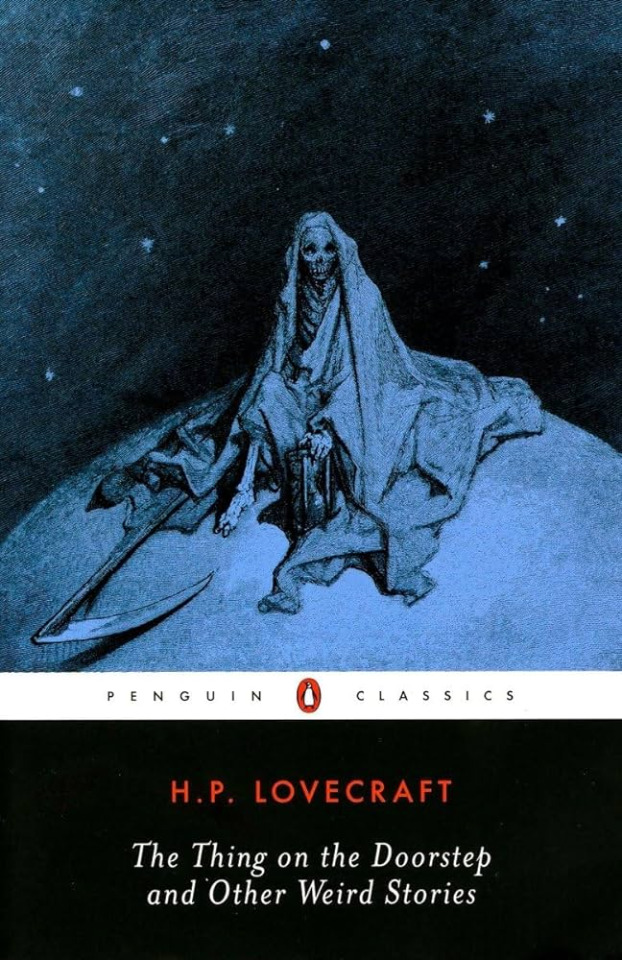
The Thing on the Doorstep and Other Weird Stories by H. P. Lovecraft
Lovecraft was relatively unknown in his lifetime—he died in 1937—but his stories were published in popular fantasy pulp magazines like Weird Tales and Astounding Stories, which is where Bucky would have come across his work. The fact that Steve recognizes Lovecraft by name means that teenage Bucky must have talked about what he was reading and the pulp stories he liked with teenage Steve, which is adorable—“this Lovecraft fellow, Steve, you wouldn’t believe the stuff he comes up with.” And Steve was paying attention enough to remember two decades and change later without the benefit of his serum-enhanced memory, which hurts my heart a little in the best possible way.
That’s how Steve all these years and decades later is able to wordlessly toss this collection of H. P. Lovecraft’s stories at Bucky on a hot hazy stumbled-upon beach in northern Florida and watch Bucky’s whole face light up.
And of course Bucky would view Lovecraft as a great beach read 😂
But this is the basis for something I’ve written into this series: Bucky excitedly sharing things he finds interesting with Steve—wanting to tell Steve first, Steve most. And although Steve is quiet, stoical and very self-contained, he’s paying a whole hell of a lot of attention.
Given that Bucky is canonically a Tolkien fan, I think the imaginativeness and ranging scope of Lovecraft’s complex, often interconnected stories would appeal to him. And, thematically, Lovecraft is distinctive for the era for having characters psychologically fragment when confronting these vast inhuman others.
“The Call of Cthulhu” opens with:
The most merciful thing in the world, I think, is the inability of the human mind to correlate all its contents. We live on a placid island of ignorance in the midst of black seas of infinity, and it was not meant that we should voyage far.
Steve and Bucky have each voyaged out a long way.
Trauma, in a way, is a form of terrible knowledge. You can heal but you can’t unknow things.
Not Language but a Map (The Grammar of Sensation)
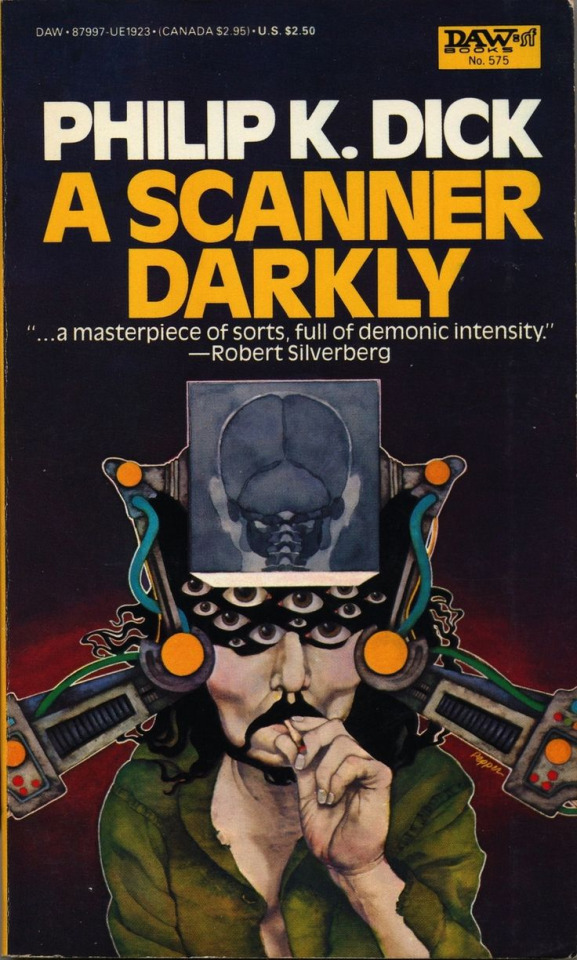
A Scanner Darkly by Philip K. Dick
This is the first book in the series that we see Bucky pick for himself. And, wow, he picks a doozy with themes of multiple and unstable identities, invasive surveillance, manipulation, psychosis, and how individuals can get chewed up by larger systems, falling through the cracks of society. Dick was writing based on his own troubled experiences with southern California drug culture of the early 70s, but this work gets at much more fundamental darknesses that I think would speak to some of the horrors Bucky has gone through and won’t talk about, not even with Steve.
Within the first few pages, we get this:
It was midday, in June of 1994. In California, in a tract area of cheap but durable plastic houses, long ago vacated by the straights. Jerry had at an earlier date sprayed metal paint over all the windows, though, to keep out the light; the illumination for the room came from a pole lamp into which he had screwed nothing but spot lamps, which shone day and night, so as to abolish time for him and his friends. He liked that; he liked to get rid of time. By doing that he could concentrate on important things without interruption.
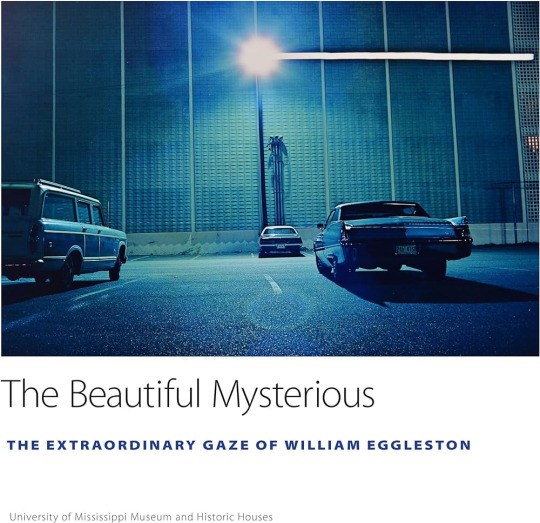
The Beautiful Mysterious: The Extraordinary Gaze of William Eggleston, edited by Ann J. Abadie
Eggleston was an early pioneer in color photography and that fascination with color is very apparent in his work. I think this focus would grab Steve as an artist who doesn’t take seeing the full spectrum of color for granted. Even in the MCU’s thin action-film scripts, Steve comments on things that offend his aesthetic sensibilities even when that has absolutely no bearing on the situation at hand, from Stark Tower to Lang’s van.
Not even a world-ending crisis can keep Steve from going, wow, no, that’s ugly. I enjoyed running with that 😂
Steve’s view of Eggleston’s photographs shifts over the course of the series, reflecting what he’s feeling, from the fragmented and disconnected detachment—“isolated and off-kilter”— that he sees in them at the beginning that shifts to the passionate engagement in the world he finds in them later.
Steve looks through the whole book of William Eggleston’s photographs again and at first the colors still roll over him like the shockwave of a distant explosion, all he can focus on. But gradually the subjects and compositions pull forward, too: monumentalized images of the everyday that at first seem neutral, the work of a detached observer. But the off-center framing of ordinary life is so deliberate as though everything might be important and where every detail deserves attention—that’s nothing like neutral. That’s not detached at all. You have to care a whole hell of a lot.
This mirrors the journey this post-Endgame Steve goes on. Because Steve Rogers should be a character who cares a whole hell of a lot, not what the MCU writers eventually reduced him to. And that’s what this fix-it is trying to fix.
Lost Vocabularies that Might Express (The Memory of These Broken Impressions)
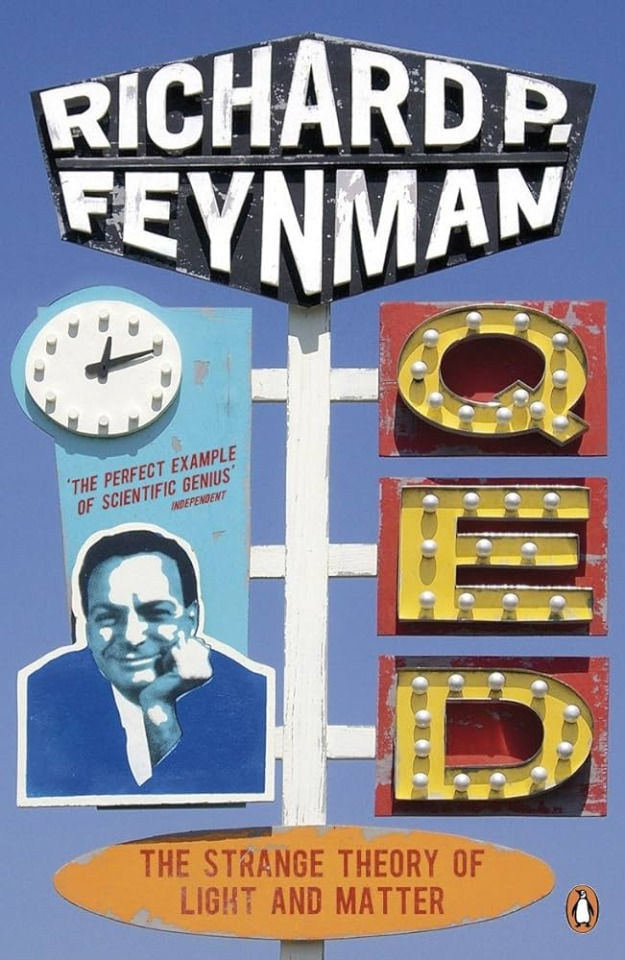
QED: The Strange Theory of Light and Matter by Richard Feynman
I love writing Bucky as a big fucking science nerd. His last night in New York and how does he want to spend the time? At a science fair with his best friend and a couple of pretty girls. So Bucky reading about quantum electrodynamics is delightful to me. The thing is, though, Bucky is a bright enough guy with a high school education. He’s not a genius—and the MCU is lousy with geniuses. But if Bucky wanted to learn a little more about all this quantum stuff he heard about in passing during some vague and very improbable sounding explanations, which by the way also allowed one of the few people still living who truly matters to him and the closest thing Bucky had left to family to fuck off to the past, well, Feynman’s QED isn’t a bad place to start in understanding some of this quantum stuff, at least.
Feynman here is very much writing for a popular audience. His writing is conversational—the book is adapted from a set of lectures he gave—and his voice is witty, casual and surprisingly light, but at the same time Feynman is deeply invested in helping lay people understand quantum mechanics. The book opens with:
Alix Mautner was very curious about physics and often asked me to explain things to her. I would do all right, just as I do with a group of students at Caltech that come to me for an hour on Thursdays, but eventually I’d fail at what is to me the most interesting part: We would always get hung up on the crazy ideas of quantum mechanics. I told her I couldn’t explain these ideas in an hour or an evening—it would take a long time—but I promised her that someday I’d prepare a set of lectures on the subject.
I prepared some lectures, and I went to New Zealand to try them out—because New Zealand is far enough away that if they weren’t successful, it would be all right! Well, the people in New Zealand thought they were okay, so I guess they’re okay—at least for New Zealand! So here are the lectures I really prepared for Alix, but unfortunately I can’t tell them to her directly, now.
C’mon! Tell me Bucky Barnes would not be hooked by this opening.
Thematically, and more seriously, the question of how could Steve do this? has two very different meanings. So far in this series Bucky isn’t ready to confront the harder version of that question which comes potentially with some very painful answers: how could Steve make that choice? Nope, he’s not ready for that. Instead, his brain unconsciously takes the easier way out: trying to understand quantum electrodynamics. 😂😭
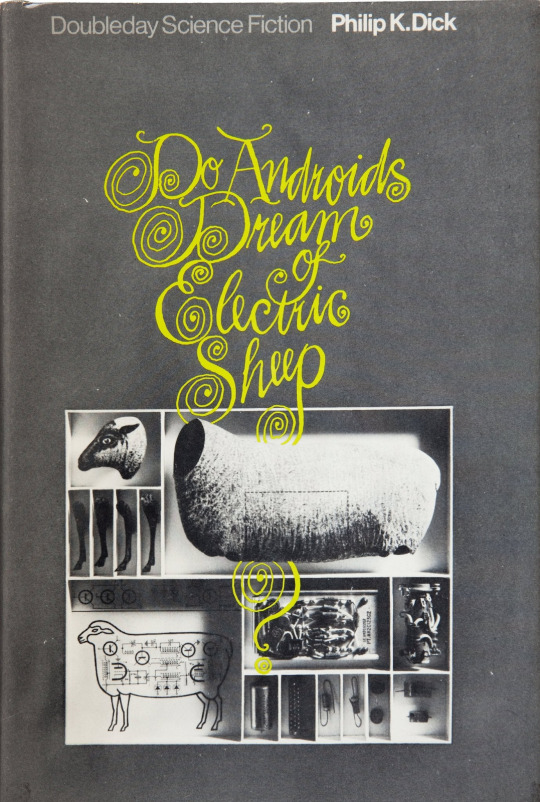
Do Androids Dream of Electric Sheep? by Philip K. Dick
Bucky must have liked A Scanner Darkly, because he went for another Philip K. Dick novel. Today remembered mostly as the source material for Blade Runner, this bleak dystopian novel is set in the aftermath of a devastating nuclear war that destroys most life on Earth. The work has themes around empathy—who feels empathy and for what?—materialism and what really makes us human.
I find it interesting how Sebastian Stan talks about The Winter Soldier in terms of someone who has undergone a process of total desensitization, which to varying degrees is deliberately part of the training of all soldiers. But rebuilding his core sense of empathy was one of the things Bucky chose to do as soon as he had any agency in that two-year period where he was on the run, which is remarkable. As a person who has been treated as though he wasn’t human and had his empathy forcibly stripped from him, I think Bucky would have a lot of complicated feelings about the enslaved androids who escape but are ruthlessly tracked down and killed. Some of these escaped androids are dangerous and do lack basic empathy—shown in the book by torturing and mutilating an animal—while other androids seem like ordinary people just trying to live their lives.
I like that Bucky talks about the book with Steve later in the story, returning in my view to a very old habit of bookworm Bucky wanting to share what he’d been reading with Steve <333
“I need to find something to read next,” Bucky says after wrapping up his description of an imagined religion that involved plugging into a box to virtually suffer the existence of a man forever walking up a steep hill while struck by crashing stones.
“Well, did the androids dream of electric sheep?” Steve asks.
“Who knows?” Bucky knocks into him gently as he takes the bowl Steve passes over. “They just wanted to be free. Though the free people just wanted to own stuff or plug into a box and suffer. So, you know, sort of a grim outlook. ”
“A little light, cheerful reading.”
“Hey, we live in a world where people write ‘Take back what’s yours’ in the streets and then smash up the windows. Dystopias don’t seem so far off the mark.”
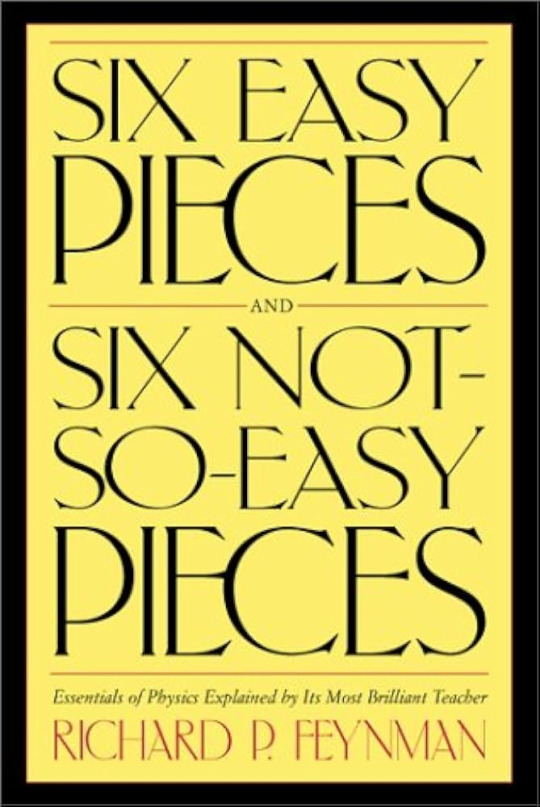
Six Not-So-Easy Pieces: Einstein's Relativity, Symmetry, and Space-Time by Richard Feynman
Another case of Bucky sticking with an author he likes! To me, this implies that Bucky has already read Feynman’s Six Easy Pieces, which explains some of the foundational basics of physics for a very broad and non-technical audience. Six Not-So-Easy Pieces is also drawn from Feynman’s famous Lectures on Physics, focusing here on relativity and space-time, but this work assumes a greater knowledge of math, hence the name. But as a legendary sniper Bucky must have a strong aptitude for math and anyway I just leaned into making Bucky an all-around nerd, because Bucky Barnes, nerd who grew up hot, is delightful to me.
Relativity, Symmetry, and Space-Time are all on point for a post-Endgame fix-it, which I think should count as a not-so-easy piece in its own right.
Throughout the series, we see Bucky using physical copies when he reads fiction, more or less from unconscious nostalgia: connecting back to memories of his younger self who was an avid reader of pulp magazines and cheap paperbacks. Once Steve gets him going with that first quietly tossed-over gift, Bucky always carries around a sci-fi or fantasy book in this series despite the limited space in his backpack. And this familiarity wouldn’t just be from his pre-war life since I figure Bucky would have gone for the Armed Services Editions that were distributed for free to soldiers. Bucky likely traded with other soldiers once he finished a book if he couldn’t get a new ASE distribution: trading in his finished novel for a new one is Bucky unconsciously falling back into another old habit.
But for non-fiction, Bucky is absolutely here for the Modern Marvel of being able to carry around as many books as he likes on his phone. I figure Bucky would have used public libraries during certain stages of his recovery when he was homeless and migratory since they are a place to get information that is consistently available in cities; and a warm, quiet place you can go with a minimal number of security cameras. I headcanon a middle-aged librarian who has a few streaks of gray in her dark hair—and who reminds Bucky of someone but he has no idea who—explaining what e-books are to this tall, gaunt, soft-spoken homeless guy with an eye contact problem. And this person who isn’t the Asset anymore and isn’t Bucky Barnes yet has the out-of-nowhere thought: huh, whaddaya know. That’s pretty neat.
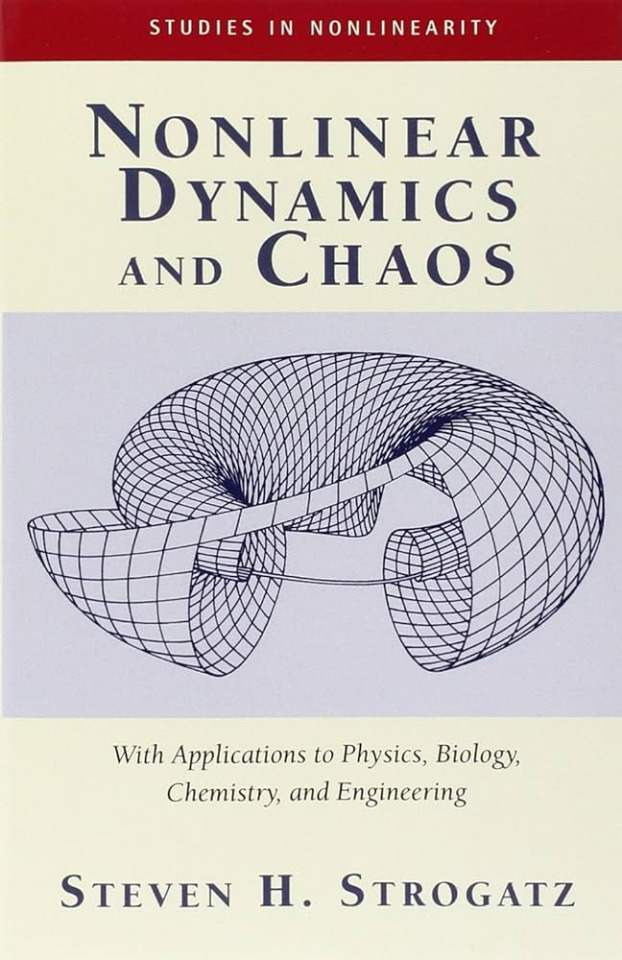
Nonlinear Dynamics And Chaos: With Applications To Physics, Biology, Chemistry, And Engineering by Steven H. Strogatz
Isolated systems tend to evolve towards a single equilibrium and these equilibrium points have been the focus of many-body research for centuries. But life is generally not that simple because most systems aren’t isolated. Often the dynamics of a system result from the product of multiple different interacting forces and objects in these systems can change between multiple different attractor wells over time. Or as Strogatz puts it:
As we’ve mentioned earlier, most nonlinear systems are impossible to solve analytically. Why are nonlinear systems so much harder to analyze than linear ones? The essential difference is that linear systems can be broken down into parts. Then each part can be solved separately and finally recombined to get the answer. This idea allows a fantastic simplification of complex problems, and underlies such methods as normal modes, Laplace transforms, superposition arguments, and Fourier analysis. In this sense, a linear system is precisely equal to the sum of its parts.
But many things in nature don’t act this way. Whenever parts of a system interfere, or cooperate, or compete, there are nonlinear interactions going on. Most of everyday life is nonlinear, and the principle of superposition fails spectacularly.
You can think of nonlinear dynamics as situations in which the sum of the parts is insufficient to understand the whole. This connects to multiple themes in this story as Bucky and Steve try to understand themselves, their lives and each other. But here Bucky is also just continuing to live his best life as a nerd with a strong intuitive knack for math, a high school education, an internet connection and a growing collection of science e-books. Or as Bucky puts it:
“It’s nice, though, like this smart guy is just talking to you but doesn’t assume you’re dumb because of what you don’t know.”
It’s touched on only very lightly in the series so far, but Bucky has a lot of complex feelings about higher education that relate to class, indirectly to sexuality, and go back to the experience of being the son of upwardly mobile working-class immigrants who were very bought-in on a traditional take on the American Dream.
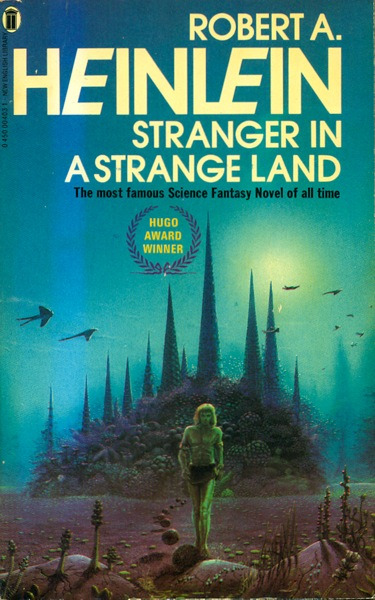
Stranger in a Strange Land by Robert A. Heinlein
I picked this partly because I thought the title would grab Bucky, who has been a stranger in a strange land several times over. Thematically this midcentury sci-fi novel focuses on challenging social norms through having the main character, a human who’d been raised by Martians on Mars, come back to Earth as an adult. A best-seller in its day that was controversial for its rejection of Christianity, monogamy and the nuclear family, the work is very tied to the looming cultural changes of the 60s and 70s.
The novel’s critical reputation has been steadily in decline for decades, but I think Bucky would find it interesting since he grew up within the traditional early 20th-century culture this novel satirizes and challenges—mores that this story’s version of Bucky didn’t unquestioningly accept but didn’t openly challenge, either.
Having Bucky pick this novel reflects the themes for the last act of this story that focus more on Steve and Bucky's different experiences as closeted queer men growing up in a deeply homophobic society. These experiences continue to shape and impact them and yet are also a past these two are coming to terms with and growing beyond.
Fun fact: this novel coined the word “grok.”
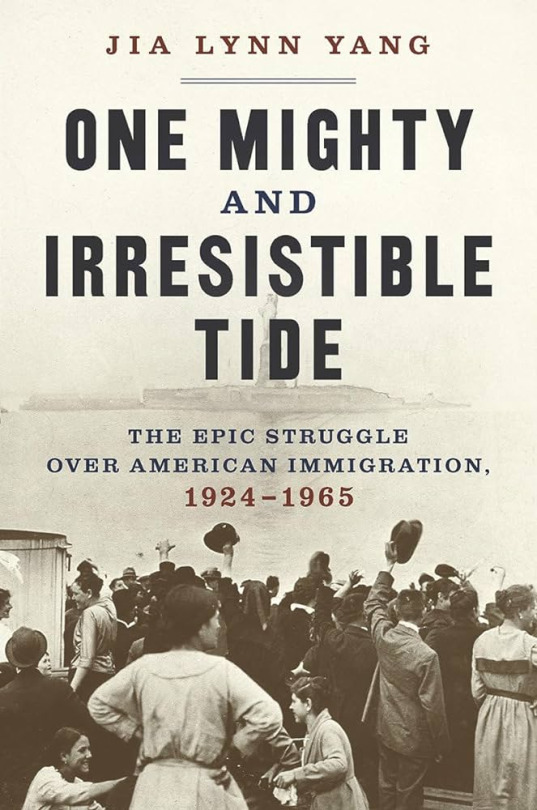
One Mighty and Irresistible Tide: The Epic Struggle Over American Immigration, 1924-1965 by Jia Lynn Yang
Of all the books featured in this series, One Mighty and Irresistible Tide is my top recommendation. This is an accessible, well-written history of a topic that haunts American history: immigration. The specific focus is the waves of legislation passed in the first half of the 20th century that tried—and often succeeded—in limiting who could legally immigrate based on the racial and ethnic hierarchies that equally haunt American history, right down to the foundation.
In this series, I wanted to pick up the themes of social justice and immigration that were so vaguely and incoherently included in TFATWS. These themes are inherent in the Snap and Return plotline except that Disney does not want to touch any of these politics with a ten-foot pole. But I remain fascinated by trying to wrap my mind around what it would mean for half the population to vanish and then return five years later, catastrophically in both cases. It’s a huge, intricate, sticky, difficult world-building problem that’s inescapably political.
Steve isn’t quite ready to dive into facing or helping to fix the problems of the post-Return world that his actions helped to create. But here we get to see Steve’s burned-out passion and conviction slowly rekindle as he reads about the complicated and often ugly history of American immigration—and he gets mad about it. Of course, he gets mad about it! This is my answer to the ludicrous idea that Steve Rogers could quietly sit out the second half of the twentieth century.
At the same time, I can have compassion for Steve knowing he can’t keep going but not knowing how to help himself, only to be given the cursed monkey’s paw of time travel. And he fucks up. His actions have real and lasting consequences. But that doesn’t make the situation hopeless or mean Steve can’t try to repair the relationships he damaged or work to regain the trust he lost, assuming he’s lucky enough to be given another chance by people who love him but have been hurt by his choices.
One of the greatest challenges in writing this Endgame fix-it was accepting Endgame as the starting point of the story and trying to reconcile a character I love with the choices canon has him make. Over the course of these stories, the central point isn’t Steve coming back to Bucky. It’s Steve coming back to himself. Through a slow and painful struggle, Steve finds himself again—rediscovering his stubborn endurance, his compassion for others and his drive to set wrongs right. Steve stumbled, badly, but he gets back up. Because that’s who Steve Rogers is.
And because of who Bucky Barnes is—his innate kindness, his warm-hearted generosity and his stubborn loyalty that isn’t blind but runs deep—that’s how these two characters come back to each other, after everything.
Deliberately, this series is the first hard-fought and hopeful glimmer in a long trudging process that can get so heavy to carry forward, day after day, but is shot through with moments of beauty and joy all the same.
I can't go on; I'll go on.
In other words, to quote one of my favorite poets: what the living do.
#thanks for the ask!#and the lovely comment#<333#book recommendations#stucky#stucky meta#lost vocabularies that might express#otp: till the end of the line#otp: even when i had nothing i had you#the existential loneliness of steven g. rogers#bucky barnes needs a hug#steve rogers also needs a hug#steve makes better choices#he's trying folks#all of my stories end up including a bunch of art and history#and I'm okay with that
20 notes
·
View notes
Note
original anon here tysm for the recs ! if the marxist frameworks was too limiting im also completely fine w general postcolonial botany readings on the topic :0
A Spiteful Campaign: Agriculture, Forests, and Administering the Environment in Imperial Singapore and Malaya (2022). Barnard, Timothy P. & Joanna W. C. Lee. Environmental History Volume: 27 Issue: 3 Pages: 467-490. DOI: 10.1086/719685
Planting Empire, Cultivating Subjects: British Malaya, 1786–1941 (2018). Lynn Hollen Lees
The Plantation Paradigm: Colonial Agronomy, African Farmers, and the Global Cocoa Boom, 1870s--1940s (2014). Ross, Corey. Journal of Global History Volume: 9 Issue: 1 Pages: 49-71. DOI: 10.1017/S1740022813000491
Cultivating “Care”: Colonial Botany and the Moral Lives of Oil Palm at the Twentieth Century’s Turn (2022). Alice Rudge. Comparative Studies in Society and History Volume: 64 Issue: 4 Pages: 878-909. DOI: 10.1017/S0010417522000354
Pacific Forests: A History of Resource Control and Contest in Solomon Islands, c. 1800-1997 (2000). Bennett, Judith A.
Thomas Potts of Canterbury: Colonist and Conservationist (2020). Star, Paul
Colonialism and Green Science: History of Colonial Scientific Forestry in South India, 1820--1920 (2012). Kumar, V. M. Ravi. Indian Journal of History of Science Volume: 47 Issue 2 Pages: 241-259
Plantation Botany: Slavery and the Infrastructure of Government Science in the St. Vincent Botanic Garden, 1765–1820 (2021). Williams, J'Nese. Berichte zur Wissenschaftsgeschichte Volume: 44 Issue: 2 Pages: 137-158. DOI: 10.1002/bewi.202100011
Angel in the House, Angel in the Scientific Empire: Women and Colonial Botany During the Eighteenth and Nineteenth Centuries (2020). Hong, Jiang. Notes and Records: The Royal Society Journal of the History of Science Volume: 75 Issue: 3 Pages: 415-438. DOI: 10.1098/rsnr.2020.0046
From Ethnobotany to Emancipation: Slaves, Plant Knowledge, and Gardens on Eighteenth-Century Isle de France (2019). Brixius, Dorit. History of Science Volume: 58 Issue: 1 Pages: 51-75. DOI: 10.1177/0073275319835431
African Oil Palms, Colonial Socioecological Transformation and the Making of an Afro-Brazilian Landscape in Bahia, Brazil (2015). Watkins, Case. Environment and History Volume: 21 Issue: 1 Pages: 13-42. DOI: 10.3197/096734015X14183179969700
The East India Company and the Natural World (2015). Ed. Damodaran, Vinita; Winterbottom, Anna; Lester, Alan
Colonising Plants in Bihar (1760-1950): Tobacco Betwixt Indigo and Sugarcane (2014). Kerkhoff, Kathinka Sinha
Science in the Service of Colonial Agro-Industrialism: The Case of Cinchona Cultivation in the Dutch and British East Indies, 1852--1900 (2014). Hoogte, Arjo Roersch van der & Pieters, Toine. Studies in History and Philosophy of Science Part C: Studies in History and Philosophy of Biological and Biomedical Sciences Volume: 47 Issue: Part A Pages: 12-22
Trading Nature: Tahitians, Europeans, and Ecological Exchange (2010). Newell, Jennifer
The Colonial Machine: French Science and Overseas Expansion in the Old Regime (2011). McClellan, James E. & Regourd, François
Colonial Botany: Science, Commerce, and Politics in the Early Modern World (2005). Ed. Schiebinger, Londa L. & Swan, Claudia
Plants and Empire: Colonial Bioprospecting in the Atlantic World (2004). Schiebinger, Londa L.
95 notes
·
View notes
Text
20th anniversary of Peter Pan (2003)
Peter Pan

International theatrical release poster
Directed by: P. J. Hogan
Screenplay by:
P. J. Hogan
Michael Goldenberg
Based on: Peter and Wendy by J. M. Barrie
Produced by:
Lucy Fisher
Douglas Wick
Patrick McCormick
Starring:
Jeremy Sumpter
Jason Isaacs
Rachel Hurd-Wood
Richard Briers
Olivia Williams
Lynn Redgrave
Ludivine Sagnier
Geoffrey Palmer
Cinematography: Donald McAlpine
Edited by:
Garth Craven
Michael Kahn
Music by: James Newton Howard
Production companies:
Universal Pictures
Columbia Pictures
Revolution Studios
Red Wagon Entertainment
Allied Stars Ltd
Distributed by:
Universal Pictures (English-speaking territories and South Africa)
Columbia TriStar Film Distributors International (International)
Release dates:
18 December 2003 (Australia)
24 December 2003 (United Kingdom)
25 December 2003 (United States)
Running time: 113 minutes
Countries:
United Kingdom
United States
Australia
Language: English
Budget: $130 million
Box office: $122 million
#peter pan#wendy darling#john darling#michael darling#george darling#mary darling#captain james hook#mr smee#the lost boys#tinkerbell#peter pan 2003#20th anniversary
7 notes
·
View notes
Note
I've heard some homophobic people say that now it's popular to support people and our church members are taking the easy way by not calling gay people to repentance. I don't see it that way and wondered what you think when people say that
I wouldn't say it's "popular" or "taking the easy way" for a Mormon to be affirming of queer people and supportive of their full inclusion in the LDS Church.
In 2023, professors still can lose their jobs at the church's BYU schools if they stray too far from the LDS Church's homophobic and transphobic teachings despite what the science and consensus is in their fields. Members who post support on Facebook, Twitter, and other social media can expect pushback from other members.
While our church leaders may have softened their rhetoric and made some changes, such as allowing people to keep their temple recommends even if they support gay marriage, the core beliefs on these topics haven't changed much. So no, I wouldn't say it's "popular" in the LDS Church to stand for full equality and inclusion of LGBTQ+ people.
With that said, certainly it's easier in 2023 than it was in 2013, easier than it was in 2003, easier than it was in 1993, easier than it was in 1983, easier than it was in 1973 for a member of The Church of Jesus Christ of Latter-day Saints to be affirming of LGBTQ+ people and to come out of the closet as yourself, at least in the USA.
We can thank queer people like Bayard Rustin, Christine Jorgensen, Marsha P. Johnson, Sylvia Rivera, Frank Kameny, Harvey Milk, Gilbert Baker, Leonard Matlovich, Steve Endean, RuPaul Charles, Ellen DeGeneres, Elton John, Laverne Cox, Lori Lightfoot and many, many others who were pioneers and moved American society to be more tolerant and accepting of queer people.
And from the LDS Church, a number of individuals have bravely stepped forward and spoken their truth & shared their experience, and that's led to awareness and eventually to increased understanding. People such as R. Joel Dorius, Leonard Matlovich, Paul Mortensen, Stephen Holbrook, Carol Lynn Pearson, D. Michael Quinn, Stuart Matis, Ty Mansfield, Mitch Mayne, Kendall Wilcox, Josh Weed, Dustin Lance Black, Jimmy Hales, Tyler Glenn, Tom Christofferson, Troy Williams, Xian Mackintosh, Laurie Lee Hall, Kris Irvin, Stacey Harkey, David Matheson, Charlie Bird, Matt Easton, Emma Gee, David Archuleta, and many others
36 notes
·
View notes
Photo
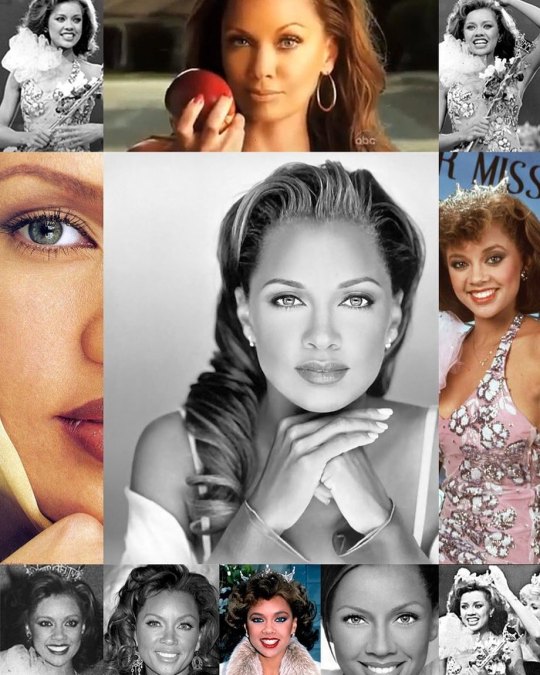
Vanessa Lynn Williams (born March 18, 1963) is a singer, actress, and fashion designer. She gained recognition as the first woman of African-American descent to receive the Miss America title when she was crowned Miss America in 1984. A scandal arose the following year when, a few weeks before the end of her reign, she learned that Penthouse magazine would be publishing now "iconic" unauthorized nude photographs of her in an upcoming issue. She resigned as Miss America in July 1984 and was replaced by the first runner-up Miss New Jersey Suzette Charles. Thirty-two years later, Miss America CEO Sam Haskell offered her a public apology. She rebounded from the scandal with a successful career as a singer and actress. She released her debut studio album The Right Stuff whose title single saw moderate success before "Dreamin'" peaked at number 8 on the Billboard Hot 100 singles chart in the US. With her second and third studio albums, The Comfort Zone and The Sweetest Days, she saw continued commercial success and received multiple Grammy Award nominations—this included her number-one hit and signature song, "Save the Best for Last". Her later studio albums include Everlasting Love and The Real Thing. She enjoyed success on both stage and screen, receiving an NAACP Image Award for Outstanding Actress in a Motion Picture for her portrayal of Teri Joseph in Soul Food. Her best-known television roles are that of Wilhelmina Slater on Ugly Betty, for which she was nominated three times for the Primetime Emmy Award for Outstanding Supporting Actress in a Comedy Series, and Renee Perry on Desperate Housewives. She is involved with several humanitarian causes. She is a supporter of LGBT rights and same-sex marriage, and in 2011 she participated in a Human Rights Campaign entitled "New Yorkers for Marriage Equality". She is partnered with Dress For Success, an organization that provides professional attire for low-income women to help support their job search and interview process. She is involved with The San Miquel Academy of Newburgh, a school for boys at risk. #africanhistory365 #africanexcellence #womenhistorymonth #womenhistorymonth https://www.instagram.com/p/Cp7fErprG2m/?igshid=NGJjMDIxMWI=
10 notes
·
View notes
Note
https://www.instagram.com/p/CvNVc5Erb5q/?igshid=MzRlODBiNWFlZA==
Can you tag Vlatko? Or airdrop to his tablet?

I’ve never seen a fan base more collectively agreeing on something as much as playing Lynn Williams. Unfortunately with that man he won’t do something unless it’s his brilliant idea.😡
2 notes
·
View notes
Text
“Vanessa Roe”, 35 (USA 1973)
Legalizing abortion didn’t make it safe, but many unfortunately assumed that it would. After Roe v Wade, the “safe and legal” myth led many women and girls to their deaths. One of them was the unidentified victim known only as Vanessa Roe.
Vanessa was 35 when she was killed. She underwent a legal abortion at an unspecified American abortion facility. She was 12 weeks pregnant and the unidentified abortionist used the suction method, also known as an aspiration abortion.
After the abortion was finished, Vanessa died. She was found to have suffered a lethal pulmonary embolism as a result of the abortion.
Death by embolism after legal abortion is very well-documented. Abortion can cause air, fetal body parts, placenta shreds, amniotic fluid and more to leak into the bloodstream. A few others who suffered an embolism from legal abortion include Vanessa Preston, Keisha Atkins, 16-year-old Loretta Morton, Sandra Lee Williams, Lynn McNair, Denise Holmes, 16-year-old Erica Richardson, 16-year-old Loretta Morton, Teresa Corbett Smith, L’Echelle Renea Head, Norma Jean Greene, 19-year-old Christina Goesswein, Gaylene Golden, 17-year-old Sharonda Rowe, 16-year-old Christella Marie Forte, Sharon Lee Margrave, Mary Ives, Danielle Roe, Megan Roe, Amy Roe, Ana Roe, Erica Roe, Eden Roe, Katherine Roe, Evie Roe, Elle Roe, Dorothy Roe, Estella Roe, Anne Roe, Ellen Roe, Saanvi Roe, Danielle Roe, Malorie Roe and Nancy Roe.
Legalizing abortion didn’t help Vanessa. It just enabled her cause of death.
Fatal Pulmonary Embolism During Legal Induced Abortion in the United States from 1972-1985, Lawson, Herschel W., MD, Atrash, Hani K., MD, MPH, Franks, Adele L., MD, American Journal of Obstetrics and Gynecology, Vol. 162, No. 4, April 1990, p. 986-990
#pro life#death from legal abortion#tw abortion#tw ab*rtion#tw murder#abortion#abortion debate#pro choice#unsafe yet legal
4 notes
·
View notes
Photo

Celia Johnson in Brief Encounter (David Lean, 1945) Cast: Celia Johnson, Trevor Howard, Stanley Holloway, Joyce Carey, Cyril Raymond, Everley Gregg, Marjorie Mars, Margaret Barton, Valentine Dyall. Screenplay: Anthony Havelock-Allan, David Lean, Ronald Neame, based on a play by Noël Coward. Cinematography: Robert Krasker. Art direction: Lawrence P. Williams. Film editing: Jack Harris. Music: Percival Mackey, Muir Mathieson. Brief Encounter is set in 1938, which explains why there is no visual evidence of or reference to World War II, which was still going on when it was made. It also helps explain some of the film's jitteriness or reticence about sex. Why, given the facility with which Laura Jesson (Celia Johnson) lies about her relationship with Alec Harvey (Trevor Howard), don't they just go ahead and have sex? The film is a portrait of prewar middle-class morality, something the war helped break down, especially with the arrival of American troops, proverbially "oversexed and over here," in Britain. When it gained great popularity after the war ended, it was possible to debate whether Brief Encounter was a validation or an indictment of this morality. Is it really healthy for Laura to spend the rest of her life with her pleasantly stuffy husband (Cyril Raymond), dreaming of what might have been? Is it necessary for Alec to uproot his family and emigrate to South Africa just because of sexual frustration? The resolution to their dilemma seems easier to us: We wish Laura and Alec could unbend, the way the working class characters Albert (Stanley Holloway) and Myrtle (Joyce Carey) seem to do. (For all her pretense at refinement, it's easy to see that Myrtle has a healthy off-duty sex life.) But then we get glimpses of the social milieu in which Laura and Alec move: He has to contend with the catty nudge-nudge-wink-wink of Stephen Lynn (Valentine Dyall), the friend whose apartment almost becomes a venue for the consummation of their passion; she is surrounded by friends whose only pleasure in life seems to be to talk. There is a real brilliance in the way which David Lean, greatly aided by Robert Krasker's noir-expressionist black-and-white cinematography, suggests the entrapment of the lovers in a world they are afraid to break out of. Johnson is magnificent, of course, and it was a stroke of genius to cast Howard opposite her. For all his kindness and attentiveness, there is something faintly menacing about him, a hint of danger and possibility that can only attract but also subtly frighten a woman whose life consists of helping her husband with the crossword and spending Thursdays in town returning her library book and shopping for an ugly desk tchotchke for his birthday. Everything in this movie is so well judged and efficiently presented that it only makes me regret that Lean turned from such intimate stories and entered on his epic phase.
4 notes
·
View notes
Text
okay let's do it this way. Each link goes to the story if it's still up on the original site, or to the surviving version on the wayback machine. These are all free to read, it looks like the site just isn't being maintained properly anymore :/
If you click the link and it leads to an error page after I make this post, copy and paste the url into the wayback machine on archive.org. You can also download the official wayback machine extension, which will automatically let you see the archived versions of a page.
Lonestar Stories.
oops they're in backwards order. sorry I'm not fixing that now.
I've only read one of them so the only warnings I have are for casual racism, misogyny, and ableism in Wolf Night by Martha Wells.
Nevermind another warning there's a giant swastika in the art for Die Rache by Steven Utley on a Nazi flag.
___
Contributing Authors in alphabetical order. I would link to their wikipedia pages but tumblr said I can't have any more links in this post. I will Not be doing any research to see if any of these are pseudonyms.
Angela Boord
Barth Anderson
Beth Bernobich
Bruce Boston
Catherynne M. Valente
Cherie Priest
Chris Roberson
Danny Adams
David C. Kopaska-Merkel
Deborah P. Kolodji
Greg van Eekhout
J. C. Runolfson
Jaime Lee Moyer
Jason Erik Lundberg
Jay Lake
Jeff VanderMeer
Jenn Reese
Jo Walton
Jon Hansen
Josh Roundtree
Josh Rountree
Karen A. Romanko
Karen L. Newman
Ken Scholes
Kevin Anderson
Lisa M. Bradley (poem not found)
Lynn Tentchoff
M. Thomas
Marge Simon
Marina Lee Sable
Martha Wells
Melissa Mar
Michael Kelly
Mikal Trimm
Mike Allen
Pam McNew
Samantha Henderson
Sanda McDonald
Sandra J. Lindow
Sandra McDonald
Sarah Monette
Sarah Prineas
Sherwood Smith
Stephanie Burgis
Steven Utley
Terrie Leigh Relf
William Goyen (story not found)
___
Issue No. 16, August 1, 2006
Wolf Night by Martha Wells Angst in D Minor by Jenn Reese The Great Conviction of Tia Inez by M. Thomas Poetry: Keeping an eye out by Jo Walton Lost Waiters by Greg van Eekhout
Helen in the Underworld by Catherynne M. Valente
___
Issue No. 15, June 1, 2006
A Night in Electric Squidland by Sarah Monette The Mountains of Key West by Sandra McDonald Wild Copper by Samantha Henderson Poetry: Circus by Jaime Lee Moyer Rasputin by Karen A. Romanko
Triptych: Three Views of the Capture of the City of Bisanthe by Samantha Henderson
___
Issue No. 14, April 1, 2006
Hekaba's Demon by Sarah Prineas The Secret Life of Dave Driscoll by Jeff VanderMeer Thread: A Triptych by Catherynne M. Valente Poetry: Practical Zombies by Mike Allen and David C. Kopaska-Merkel Before I Was Born by Steven Utley
The Frog-Wife by Catherynne M. Valente
___
Issue No. 13, February 1, 2006
10 Archetypes in 2000 Words by Cherie Priest Evergreen by Angela Boord Can't Buy Me Faded Love by Josh Rountree Poetry: I Build Engines by Bruce Boston Rosebed by J. C. Runolfson A Candlemass Poem by Jo Walton
Strange Pageantry by Jenn Reese
___
Issue No. 12, December 1, 2005
A Lock of Ra by Sandra McDonald Maggie's Christmas List by Pam McNew Scales by Samantha Henderson Poetry: Is this the face? by Jo Walton Two Scifaiku by Deborah P. Kolodji Convolutions and Labyrinths by Marina Lee Sable
___
Issue No. 11, October 1, 2005
The Hero and the Princess by Sherwood Smith Accident of Birth by Stephanie Burgis Four Clowns of the Apocalypse by Jay Lake Poetry: A Word before the Ice Wars by Bruce Boston Window on the world by Jaime Lee Moyer Every Thirty Years on Cygnus 5 by Samantha Henderson
___
Issue No. 10, August 1, 2005
A Treatise on Fewmets by Sarah Prineas
The Tailor and the Fairy by Samantha Henderson
Book of the Flagellants by Mikal Trimm
Poetry:
Now, While the Stars are Invisible by Danny Adams
Reincarnation in Andromeda by Deborah P. Kolodji
In Late December by Beth Bernobich
___ Issue No. 9, June 1, 2005
The Hangman Isn't Hanging by Jay Lake
No Mosquito is a God by Jon Hansen
A Good Hair Day in Anarchy by Ken Scholes
Poetry:
My Brother, He Has a Wonderful Thing by Pam McNew
Do Over by Karen L. Newman
Reptile Brain by Samantha Henderson
___ Issue No. 8, April 1, 2005
The Heirs of Cenpa by Sandra McDonald
Cicada by M. Thomas
Manuscript Found Written in the Paw Prints of a Stoat by Samantha Henderson
Poetry:
In Retirement by Marcie Lynn Tentchoff
The Art of Becoming by Melissa Marr
it is the sky that calls to us by Terrie Leigh Relf
___ Issue No. 7, February 1, 2005
Winged Victory by Sarah Prineas
Maenad by Angela Boord
Time, As Seen in a Merry-Go-Round Blur by Michael Kelly
Poetry:
And We Shall Go A'Questing by Mikal Trimm
Little Dark Stupa Girl by Pam McNew
The Ivory Lady by Samantha Henderson
___ Issue No. 6, December 1, 2004
Giant by Stephanie Burgis
The Artists Pentaptych by Jason Erik Lundberg
Upstart by Steven Utley
Poetry:
On Meeting the Surgeon by Melissa Marr
The Children's Crusade by Karen A. Romanko
Stepping into the Role by Steven Utley
___ Issue No. 5, October 1, 2004
The Ninth Arrest by Barth Anderson
Friday Night Gods by Josh Rountree
Die Rache by Steven Utley (this one has a swastika and a Nazi flag as the story art right at the top of the page.)
Poetry:
The Sipper's Wife by Sandra J. Lindow
The Castaway Bar: 1967 by Marge Simon
More Trouble by Steven Utley
___ Issue No. 4, August 1, 2004
Crimson Mud, Drying Blood by Jay Lake
With Stealth and Grace, The Hunter Roams by Mikal Trimm
Mysterious Ways by Steven Utley
Poetry:
Abduction by Samantha Henderson
The Weather Knows No Change by Mikal Trimm
Cosmic Ignorance by Steven Utley
___ Issue No. 3, June 1, 2004
Thorns by Martha Wells
Conjuring by M. Thomas
Cool Rejection by Josh Rountree
Poetry:
Frost on the Saddle by Mikal Trimm
Immobility by Lisa M. Bradley (No link provided. I can't find it elsewhere.)
Medusa's End by Mikal Trimm
___ Issue No. 2, April 1, 2004
Bad Medicine by Martha Wells
The Angle of My Dreams by Jay Lake
A Garden of Fists by Barth Anderson
Poetry:
Under the Farm by David C. Kopaska-Merkel
Sun's Stroke by Lisa M. Bradley (No link provided. I have spent 2 hours trying to find it online and cannot. Here's this at least. I have no money to buy the collection it was added to later.)
___ Issue No. 1, February 1, 2004
Pax Agricola by Jay Lake
Ink Spot by Kevin Anderson
Wishes by Chris Roberson
Fiction from the Dead:
Ghost and Flesh, Water and Dirt by William Goyen (PDF on the Internet Archive from another collection. Only version I've found so far.)
___
#Lonestar Stories#masterpost#free books#it COUNTS OKAY#short stories#poetry#long post#fantasy#scifi#idk#probably other genres#poems
1 note
·
View note
Text
9 Months Deep Into 2024… Rap Recap 🗓️
Mr. Grande
youtube
9 months deep into 2024. Let’s go back, recap once more
January
Katt (katt williams)
Big Foot (naval station norfolk)
Gypsy press tour (gypsy rose)
Aliens
Amelia washed up on shore (amelia earhart)
February
Taylor and Travis at the game (taylor swift, travis kelce)
Drake made a movie
Snakes on a Plane (2006)
One Oompa Loompa and their newfound fame. “The Unknown” brought Glasgow great pain (Willy’s Chocolate Experience in Glasgow Scotland)
March
Storytime with JLo (jennifer lopez)
No chick-fil-a sauce (no Chick-fil-A sauce girl, gina lynn)
Bridge hit by the boat (Francis Scott Key bridge in Baltimore, Maryland)
Eternal Sunshine (ariana grande)
Cowboy Carter, let’s go (beyonce)
Rep. Nancy Pelosi, D-Calif: Tic Tac Toe (tiktok)
April
New York City is shaken (earthquake)
Case closed on OJ Simpson
New Tay Tay Kim K diss drop (kim Kardashian, thanK you aIMee)
JoJo Siwa inventing gay pop
May
Billie drops (billie eilish)
Nicki locked up before show (nicki minaj)
Baby wanna go to Four Seasons Orlando
Eurovision
Northern Lights
Portal got naughty (new york-dublin portal)
Bleach blonde bad built butch body (jasmine crockett, marjorie taylor greene)
.
AOC vs Marjorie got wild (alexandria ocasio cortez, marjorie taylor greene)
The met gala had extra questionable style
34, the magic number at the Trump trial (prosecution of donald trump in new york)
Drake got converted to a PDF file (kendrick lamar, kendrick vs drake)
June
Heat waves everywhere like everywhere is Phoenix
Charli and Lorde work it out on the remix (charli xcx, girl so confusing)
Chappell Roan statue (statue of liberty costume, governors ball music festival)
This just in… (justin timberlake, this is going to ruin the tour)
Carpool karaoke with Kim and Putin (kim jong un, vladimir putin)
July
This one’s an EAR full. Where to start?
America becomes an episode of South Park (2024 shooting at a donald trump rally, assassination attempt, thomas matthew crooks)
Simone still GOATed (simone biles, paris Olympics) Joe got covid (joe biden, coronavirus)
Trump got shot, and bro emoted
August
Blake Lively bullied interviewer
Social security no longer secure (2024 national public data breach)
Raygun (2024 Paris Olympics, rachael gunn, raygun_aus, breakdancing)
Mpox (Tedros Adhanom Ghebreyesus, monkeypox)
Very demure (mindful, jools lebron, joolieannie)
Short n’ Sweet (sabrina carpenter)
Bye BRAT summer (charli xcx)
September
Hollywood exposed (p diddy allegations, sean combs)
Climate change grows (hurrican helene)
Submersible is back in the blogs (oceangate, stockton rush)
8 year old goes to target (zoe wilson, tangie)
and bros …
Trump: They're eating the dogs! (presidential debate, abc, donald trump, kamala harris, jd vance, haitian immigrants, Springfield pet-eating hoax)
.
Baby oil sales go down the drain (p diddy, johnson & johnson)
The world got pranked by the king of mukbang (nikocado avocado, nicholas perry, two steps ahead)
A new iPhone (iPhone 16)
And a new moon came (2024 PT5)
All rise for the new supreme Moo Deng (pygmy hippopotamus, khao kheow open zoo, thailand zoo)
.
Cleo fights Ice (cleopatra, ice spice, baby storme, y2k tour)
and Mozart's hot again (wolfgang amadeus mozart, leipzig municipal library, Köchel catalogue, Serenate ex C, Ganz kleine Nachtmusik)
Spray tan MAGA man Missed A Gunshot Again (Attempted assassination of Donald Trump in Florida, ryan wesley routh, trump international golf club)
Midwest Princess cussin and shushed him (chappell roan, you shut the fuck up, 2024 vma, mtv video music awards)
SWEAT tour (charli xcx, troye sivan)
Apple war touchin interruption (charli xcx, kelley heyer, apple dance, apple cam)
0 notes